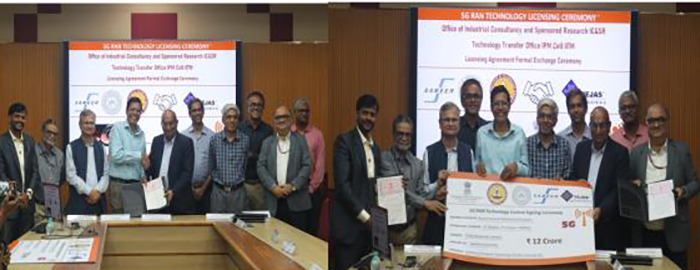NARASIMHAN KASTHURI
CHENNAI, DEC 15
In one of the largest technology transfer deals from academia in India, a 5G RAN (Radio Access Network) technology developed by a multi-institutional team has been licensed to an industry partner Tejas Networks, a Tata Group Company.
With the objective of developing cost-effective #5G network connectivity for #ruralindia, @iitmadras & @TejasNetworks have inked a #MoU for utilising the 5G network technology invented by the Institute.
Read in @ETVBharatTN.https://t.co/E6oBcaDTJq@Ravicha87018067#5G pic.twitter.com/lI6SlDX4nR— IIT Madras (@iitmadras) December 13, 2023
IIT Madras, IIT Kanpur and the Society for Applied Microwave Electronics Engineering and Research (SAMEER) developed a ‘5G RAN sub-system’ at the 5G Test Bed. The three institutions are jointly licensing the 5G RAN technology to Tejas Networks who will play a vital role in leveraging it for further advancements and commercial applications.
Tejas will pay a Transfer of Technology (ToT) non-exclusive, license fee of Rs 12 crore in multiple instalments based on technical milestones.
The Licensing Agreement formal exchange ceremony was held on December 11 at the IIT Madras campus. Prof. V. Kamakoti, Director, IIT Madras; Dr. Kumar N. Sivarajan, CTO of TEJAS NETWORKS, Prof. Bhaskar Ramamurthi, IIT Madras; Dr. P. Hanumantha Rao, Director General, SAMEER; Prof. Rohit Budhiraja, IIT Kanpur and Dr. Radhakrishna Ganti, IIT Madras, who are the Principal Investigators of 5G Test bed from their respective institutes; and Prof. Ajit Kumar Chaturvedi, Department of Electrical Engineering, IIT Kanpur and former Director, IIT Roorkee, representative on behalf of Director IIT Kanpur, were among those who were present at the event.
Others present on the occasion included Sudhir K. Marwaha, Group Co-Ordinator CC & BT, Ministry of Electronics and Information Technology (MeitY). Prof. V. Kamakoti, Director, IIT Madras, this initiative is in line with the Atmanirbhar Bharat vision of the Union Government.
“This is an outstanding example of how translational research must happen in an inter-institutional, inter-disciplinary manner. This is a great example of how research should translate into a product and then get deployed. I hope a billion users of our country will benefit from this technology,” he added.
Speaking about the development, Prof. S. Ganesh, Director, IIT Kanpur, said, “IIT Kanpur has been a pioneer in communication research in India. Our faculty have played a pivotal role in the development of this state-of-the-art indigenous 5G Test bed, specifically by developing the Baseband Unit (BBU) of the 5G NR base station at the institute. As we know, 5G test bed has been developed as part of a multi-institute collaborative project. This collaborative effort not only complements India’s stride in ground-breaking transformative innovation but also opens up tremendous growth prospects for India’s rapidly evolving telecommunication industry.”
The 5G Test Bed was developed indigenously through a collaborative project involving eight institutes and funded by the Department of Telecommunications (DoT), Ministry of Communications. The 5G Test Bed was inaugurated by the Prime Minister, in May 2022, and has since been used extensively by industry and academia for testing new 5G products and use-cases.
Dr. P. Hanumantha Rao, Director General, SAMEER, said, an autonomous R&D organization under the MeitY, has contributed in building an active MIMO and massive MIMO antennas and fully integrated mmWave phased arrays at FR1 (Sub 6 GHz) and FR2 (mmWave) bands respectively. The knowledge sharing of fully-functional 5G RAN technology of SAMEER in collaboration with IIT Madras and IIT Kanpur to Industry is a breakthrough achievement to create a secured 5G eco-space in telecom sector.
Dr. Kumar N. Sivarajan, CTO and Co-founder, Tejas Network said, “The agreement sets a new benchmark in industry-academia collaboration in India’s high-technology sector. As India’s leading R&D driven telecom products company, we look forward to translating these cutting-edge innovations and integrating them into industry-leading products and solutions for India and the world.”
At the 5G Test bed, the hardware, firmware and software are being developed for the 5G base station in India. The 5G base station forms the radio access network (RAN) part of the 5G system. The base station is connected to the core network on one side on an IP network and the user equipment (cell phones) on the radio side.
Elaborating further, Prof. Ajit Kumar Chaturvedi, Department of Electrical Engineering, IIT Kanpur and former Director, IIT Roorkee, said, “Every facet of the 5G test bed project has been conceptualized in-house. Prof. Rohit Budhiraja, Principal Investigator of the 5G Test bed Project, IIT Kanpur, said, “IIT Kanpur has designed state-of-the-art 5G hardware and algorithms for the 5G Test bed. The institute’s dedicated efforts in this domain signify a commitment to developing cutting-edge technology in the field of 5G wireless communication.”
Dr. Radhakrishna Ganti, Department of Electrical Engineering, IIT Madras, and Principal Investigator from IIT Madras, 5G Testbed Project said, “This will shape the future of telecom technologies and deployments in India.”
(Narasimhan Kasthuri was a veteran journalist with The Hindu and Financial Express covering business, IT etc. Now, in the US West Coast, he covers technology for NE. He can be contacted at @narasimhan.kasturi@yahoo.com, Mobile: +1 (650) 793-0056)












